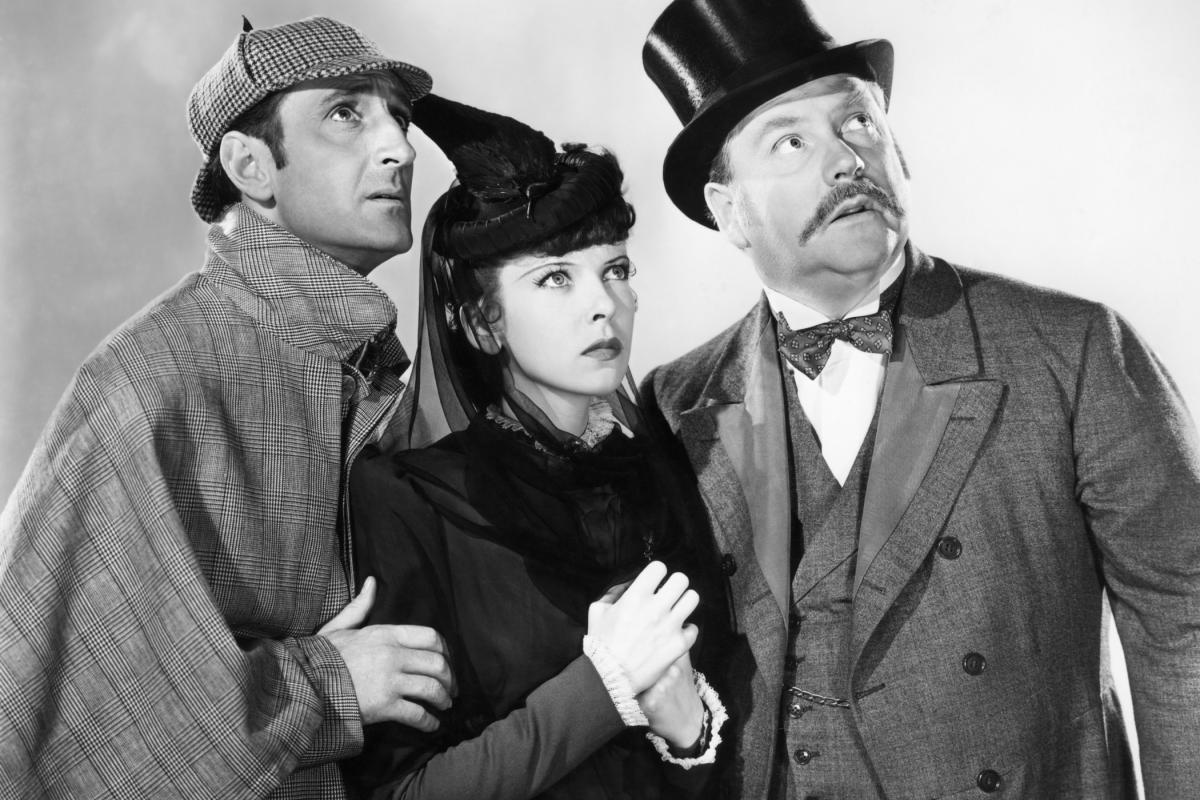‘My whole success depends upon a peculiarity of Holmes’ brain – its perpetual restlessness, its constant struggle to escape boredom.’ - Professor Moriarty, ‘The Adventures of Sherlock Holmes’
Of course, the definitive screen interpretation of Sherlock Holmes was provided by Basil Rathbone, who starred as Sir Arthur Conan Doyle’s private detective in a series of fourteen films between 1939 and 1946.
Tall, thin, angular and aristocratic, with an aquiline nose, Rathbone was once described as 'two profiles pasted together.' For the role of Holmes he donned a tweed deerstalker hat and Inverness cape, smoked a calabash pipe and pursued a cold deductive logic.
Holmes was assisted by his trusty companion, Watson - brilliantly played by Nigel Bruce as a bumbling, pompous but well-meaning fool. Together they navigated perplexing puzzles, pedestrian policing, suspects with dubious motives and nefarious villains. It was a world of red herrings, MacGuffins, false endings and parallel intertwined plots.
1939’s ‘The Adventures of Sherlock Holmes’ begins with Holmes’ arch-enemy Professor Moriarty escaping a court conviction. Moriarty, sharing a taxi back from the trial with a frustrated Holmes, vows to commit a sensational crime, and to discredit Holmes in the process.
'I'm going to break you, Holmes. I'm going to bring off right under your nose the most incredible crime of the century, and you'll never suspect it until it's too late. That will be the end of you, Mr. Sherlock Holmes.'
Subsequently we learn that Moriarty plans to distract Holmes from a really serious felony by setting him a more intricate and intriguing puzzle.
‘He’s like a spoiled child who picks watches to pieces, but loses interest in one toy as soon as he’s given another. So I’m presenting the ingenious but fickle Mr Holmes with two toys… I’ll give him a toy to delight his heart, so full of bizarre complications that he’ll forget all about the first toy.’
And so we embark on a plot that involves a damsel in distress, a chinchilla charm and a cryptic drawing of a man with an albatross round his neck. There’s also a club-footed criminal leaving marks in the ground and a murderous flute-playing gaucho on the prowl.
While Holmes concerns himself with solving this absorbing riddle, he disregards a routine request to protect the Crown Jewels in the Tower of London.
This storyline resonated with me. Many’s the time in business that we find ourselves chasing the small but seductive, in preference to the boring but important. We readily tire of the familiar and frustrating aspects of incumbent accounts, the tedious day-to-day annoyances. We find ourselves instinctively drawn to the shiny and new, the challenging and thought provoking; to the prospect of developing fresh solutions and pioneering relationships. We channel time and resource into the thrilling pitch and the cool account, while leaving the big corporate Clients unloved and under-resourced. We prioritise the interesting ahead of the important.
Of course, creative opportunities can translate into profile-building campaigns and successful brands. ‘Great oaks from mighty acorns grow.’ But there is a balance to be struck. Smart Agency leaders know how to direct the enthusiasms of their teams across a variety of tasks, satisfying their natural appetite for stimulation and provocation, while at the same time addressing the commercial imperative. Indeed the truest test of a great Agency is its ability to find creative and compelling solutions to big, intractable corporate problems.
‘The Adventures of Sherlock Holmes’ concludes with a victorious Holmes saying ‘Elementary, my dear Watson.’ It was the first use of a phrase that did not appear in Conan Doyle’s original canon of Holmes stories.
‘The Adventures of Sherlock Holmes’ was the second Rathbone-Bruce movie produced by 20th Century Fox, and more were planned. However, with the onset of the Second World War, the studio became concerned that dramas set in the Victorian era would be less relevant. Surely thrillers featuring foreign agents and spies would make for better box office. And so they determined to shelve any future Holmes pictures.
Universal Studios took a different view. They stepped in, negotiated the rights with the Conan Doyle Estate, signed contracts with Rathbone and Bruce, and updated the stories to contemporary settings. This enabled Sherlock Holmes to take on the Nazis and the studio to make twelve more films.
‘Elementary, my dear Watson.’
'My mind's distracted and diffused.
My thoughts are many miles away.
They lie with you when you're asleep,
And kiss you when you start your day.’
Simon & Garfunkel,'Kathy’s Song' (P Simon)
This piece first appeared on Jim Carroll's blog here.



